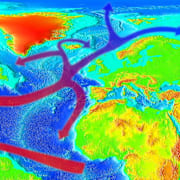
The Gulf Stream. Wikimedia Commons.
Study: The Gulf Stream may stop as early as 2025
The Atlantic Gulf Stream could collapse as early as 2025, which would have catastrophic consequences for the climate. It is claimed in a recent study, according to The Guardian.
The current carries warm water north through the Atlantic, but a greater influx of colder water from melting sea ice puts it at risk of stopping.
In the study, which was published in the journal Nature, it is estimated that it will happen sometime between 2025 and 2095 – most likely around 2050 – if emissions do not decrease.
However, the study has been criticized by other researchers who believe that the uncertainties in the data are too great to be able to make such precise time assessments.
The Gulf Stream is of decisive importance for northern Europe having such a mild climate for its latitudes. A collapse would lead to a significantly colder climate in Sweden.

People seek coolness in the hot Mediterranean Sea. Gaza City, July 23, 2023. Fatima Shbair / AP
Climate threatGlobal challenges
Heat record for the Mediterranean on Monday: 28.7 degrees
On Monday, the highest ever average temperature for the surface of the Mediterranean Sea was measured: 28.71 degrees. Researchers at Spain's Institute of Oceanography told AFP.
The most recent record for the highest average temperature during a day was from August 23, 2003, when the surface of the Mediterranean Sea was 28.25 degrees warm. The measurements are made with satellites from the EU's Earth observation program Copernicus.
“It's only July. We usually see the highest temperatures of the year in August," writes British meteorologist Scott Duncan on Twitter.
The high temperatures hit marine life hard, and the UN climate panel IPCC has documented a sharp decline in biodiversity in the Mediterranean since the 1980s.
Inga kommentarer:
Skicka en kommentar